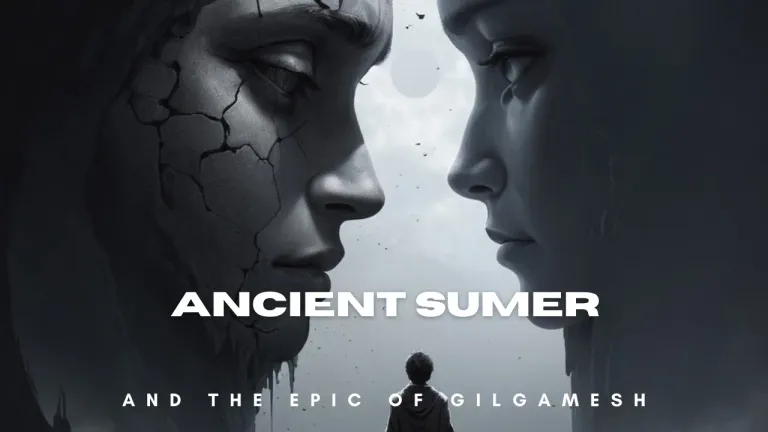The Epic Of Gilgamesh
The Epic of Gilgamesh: The World’s Oldest Hero’s Journey
When you think of epic tales, you might immediately picture the adventures of Hercules, Odysseus, or even Harry Potter. But long before these heroes made their marks on history, there was a king named Gilgamesh, whose story is considered one of the world’s oldest known literary works. The Epic of Gilgamesh is not only a fascinating ancient text, but it's also one of the first stories to explore themes of friendship, mortality, and the search for immortality.
Who Was Gilgamesh?
Gilgamesh, the central figure of the epic, was a king of the Sumerian city-state of Uruk in ancient Mesopotamia. According to the text, he was two-thirds divine and one-third human. This made him a figure of extraordinary strength and wisdom, but also prone to arrogance and rash decisions. Early in the epic, he is shown to be a powerful and somewhat selfish ruler, causing unrest among his people.
The Epic of Gilgamesh tells the story of his transformation, a journey that ultimately leads him to understand the limits of his own power and the inevitability of death.
What’s the Big Deal About This Epic?
The Epic of Gilgamesh was first written down around 2100 BCE in Akkadian, a Semitic language of ancient Mesopotamia. It was originally passed down orally in Sumerian. The story is based on the real-life king Gilgamesh, but much of it is mythological. The epic consists of twelve tablets and covers Gilgamesh’s quest for immortality, his friendship with the wild man Enkidu, and his search for the meaning of life.
But what makes this story so special? Here are a few reasons why:
It’s the First Hero’s Journey: Long before Joseph Campbell popularized the "Hero's Journey," Gilgamesh was already undergoing a transformative quest. His epic is full of trials, growth, and the pursuit of wisdom, similar to the themes you’ll find in modern-day adventures.
Deep Philosophical Questions: Gilgamesh isn’t just battling monsters; he’s confronting existential questions like, "What happens after death?" and "What’s the point of life if we’re all going to die anyway?"
Enduring Friendship: The bond between Gilgamesh and Enkidu, a wild man created by the gods to be his equal, stands at the heart of the epic. Their relationship transcends time and provides some of the most touching moments in the story.
Key Themes in The Epic of Gilgamesh
1. Friendship and Companionship
Gilgamesh’s life takes a profound turn when he meets Enkidu. At first, they’re enemies, but after an epic battle, they form a deep friendship that changes both of them. Enkidu teaches Gilgamesh about humility and the value of life beyond power. In return, Gilgamesh helps Enkidu transition from his wild, animalistic existence to a more human, thoughtful way of life.
What does their friendship tell us about the importance of companionship in personal growth?
The friendship between Gilgamesh and Enkidu shows that growth often happens when we find people who challenge and support us. This partnership teaches Gilgamesh the importance of love and respect for others, ultimately humanizing him in a way that he wasn’t before.
2. The Fear of Death
After the death of Enkidu, Gilgamesh is devastated and overwhelmed by the realization that death comes for everyone, even the strongest and most heroic of men. This fear drives his quest to find immortality by seeking the secret of eternal life.
How does Gilgamesh’s reaction to death resonate with modern readers?
Gilgamesh’s fear of death is a universal emotion. Everyone, at some point, must confront the fact that life is fleeting. The epic encourages readers to reflect on their own mortality and think about how they can live meaningful lives despite knowing that death is inevitable.
3. The Search for Immortality
In his quest, Gilgamesh meets Utnapishtim, a survivor of a great flood, who shares his secret of immortality. Utnapishtim reveals that immortality is reserved for the gods, and that humans, no matter how heroic, must accept death as a part of life.
What does Utnapishtim’s story teach Gilgamesh, and what does it teach us?
Utnapishtim’s message is clear: immortality is not meant for humans. Through his conversation with Utnapishtim, Gilgamesh learns to accept death, realizing that the true meaning of life lies in how we live and the legacy we leave behind. This teaches us that, while we can’t escape death, we can still shape our lives with purpose and significance.
Modern Relevance: Why Should We Care?
The Epic of Gilgamesh may be thousands of years old, but its themes are incredibly relevant today. Whether we are seeking meaning in our own lives or grappling with the inevitability of death, Gilgamesh’s journey resonates with the human experience.
How does Gilgamesh's quest for immortality reflect our own desires for permanence?
Just as Gilgamesh sought to conquer death, modern society often seeks ways to preserve legacies, memories, and even our bodies through technology. We strive for longevity, whether through health, technology, or cultural impact. However, Gilgamesh’s story reminds us that true immortality isn’t found in avoiding death, but in how we live and what we contribute to the world.
The Timeless Nature of the Epic
The Epic of Gilgamesh is more than just an ancient tale; it’s a profound meditation on life, death, and the human condition. As we navigate our own lives, this ancient story invites us to reflect on our relationships, our personal growth, and our place in the world. In the end, Gilgamesh teaches us that the journey is just as important as the destination—and that understanding our mortality is the key to living fully.
So, what will you do today, knowing that life is both precious and fleeting? Maybe the answer lies in how you choose to live, just like Gilgamesh.
Posted by Waivio guest: @waivio_cosmicsecrets
